Travel News
How Airlines Are Targeting Business Travelers and Baby Boomers
With airlines charging for the smallest fees, it’s hard to feel like you’re getting a good deal on airplane fare. But is there more to it? Contributing writer David DeVoss analyzes the issue of airline services, and how major airlines plan to keep customers loyal and engaged. This also means paying attention to a lucrative market: baby boomers.
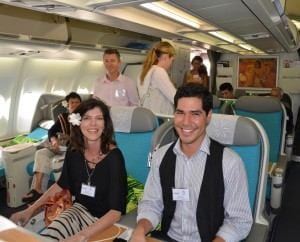 Air Tahiti Nui is not one of your larger airlines. It ferries leisure passengers to French Polynesia on five aging A340 airbuses. Recently, it faced a major dilemma: spend $17 million on a down payment for two new aircraft or invest in renovating its existing fleet.
Air Tahiti Nui is not one of your larger airlines. It ferries leisure passengers to French Polynesia on five aging A340 airbuses. Recently, it faced a major dilemma: spend $17 million on a down payment for two new aircraft or invest in renovating its existing fleet.
For Nick Panza, Air Tahiti Nui’s North American vice president, the decision was easy. “We increased the number of business class seats 30 percent by eliminating the under-used first class cabin,” he explained. “Then we installed wider economy seats with greater pitch that include a state of the art entertainment system.
“Because the new economy seats weigh less than half the old ones, eventually we’ll save hundreds of thousands of dollars on fuel,” says Panza. “The investment allows Air Tahiti Nui to have the same inflight entertainment and cabin experience as our codeshare partners.”
So why is an airline flying 95 percent leisure passengers expanding its business class service? Because baby boomers, the largest and most affluent generation in the history of America, are approaching retirement age at the rate of 10,000 a day. Not only do they have money, but according to the Pew Research Center in Washington DC, boomers don’t believe they are getting old.
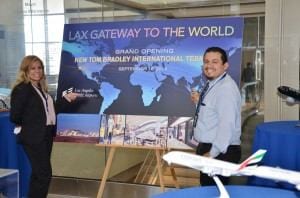 After a decade of retrenchment and consolidation, airlines and airports are spending money in anticipation of exponential growth in travel. Just this summer Delta Air Lines spent $2 billion to make JFK’s Terminal IV the most modern in the country. Last month, Los Angeles World Airports opened a renovated international terminal costing $1.9 billion. LAX is happy to spend the money since economic analysis shows that the airport generates $39.7 billion annually in employment income, economic output, and capital and visitor spending.
After a decade of retrenchment and consolidation, airlines and airports are spending money in anticipation of exponential growth in travel. Just this summer Delta Air Lines spent $2 billion to make JFK’s Terminal IV the most modern in the country. Last month, Los Angeles World Airports opened a renovated international terminal costing $1.9 billion. LAX is happy to spend the money since economic analysis shows that the airport generates $39.7 billion annually in employment income, economic output, and capital and visitor spending.
“Airlines were focusing on investing their money on the ground,” says Neil James, executive director of corporate sales and product management for Panasonic Avionics, which makes in-seat entertainment systems for airlines like Delta and American. “But today there is a realization that airlines must win passengers in the air as well as on the ground.”
Back in the late 1970s, when President Jimmy Carter deregulated the airline industry, analysts waxed poetic about the “democratization” of air travel. Low-cost carriers like Spirit Airlines that view transportation as a commodity still compete to keep travel prices low. But legacy carriers are increasingly providing luxury services for passengers willing to pay.
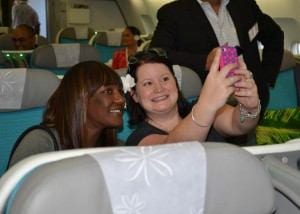 United Airlines is expanding its “Premium Service” from LAX to JFK and from SFO to JFK. Eight of the 13 planes that offer the service feature 28 lay-flat seats with 15.4-inch entertainment screens and all-natural scones and cookies made from scratch, plus access to United’s airport lounge with complimentary drinks.
United Airlines is expanding its “Premium Service” from LAX to JFK and from SFO to JFK. Eight of the 13 planes that offer the service feature 28 lay-flat seats with 15.4-inch entertainment screens and all-natural scones and cookies made from scratch, plus access to United’s airport lounge with complimentary drinks.
United plans to configure a total of 15 planes with the lay-flat seats and other extras by the end of the year.
Airlines are financially healthy in part because of highly unpopular fees for once-free services like checking a bag and changing a reservation. Last year, these two fees alone brought airlines over $6 billion. Airlines earned an additional $9 billion selling seat upgrades and frequent flyer miles. In truth, fees now account for 10 percent of U.S. airlines’ revenue.
Now airlines are recasting fees as “trip enhancements.” They are betting that with employment up and consumer confidence on the rise, passengers will gladly pay a few dollars more for extra legroom, early boarding, and access to airport lounges. Some airlines now rent Apple iPads loaded with movies, sell hot business class meals to coach customers, and allow passengers to pay for an empty seat beside them. For $30 U.S. Air will allow a busy corporate executive or harried mother with children to skip baggage claim and have their luggage delivered to an office or home.
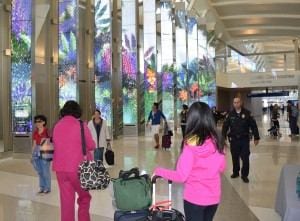 Some passengers still may use a travel agent to buy a ticket. But after the reservation is made new technologies allow the airline to deal directly with the passenger prior to the date of travel, during check-in, and while the passenger is walking to the boarding gate. Delta recently provided its gate agents with wireless devices that allow them to sell last-minute seat upgrades.
Some passengers still may use a travel agent to buy a ticket. But after the reservation is made new technologies allow the airline to deal directly with the passenger prior to the date of travel, during check-in, and while the passenger is walking to the boarding gate. Delta recently provided its gate agents with wireless devices that allow them to sell last-minute seat upgrades.
“We have massive amounts of data,” says Delta CEO Richard Anderson. “We know who you are. We know what your history has been on the airline. We can customize our offerings.”
Responding to passenger feedback, a few airports have set aside space for cell-sized sleeping rooms, cinemas, green outdoor areas, and standing holograms that explain TSA rules to travelers awaiting inspection. But a survey of 2,100 travelers conducted this September by FlightView, a Massachusetts company providing free day of travel information to passengers with mobile devices, reveals that passengers put a premium on practicality.
“Travelers want to be able to use electronic devices that allow them to be productive professionally,” says FlightView CEO Mike Benjamin. “This means charging stations for electronics plus free, reliable, and secure W-Fi accessibility from anywhere in the airport.”
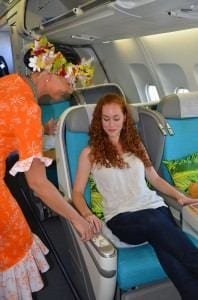 More than 73 percent of respondents said tray tables with electronic hookups and charging capabilities would be their preferred inflight perk. Also high on the list is free inflight WiFi.
More than 73 percent of respondents said tray tables with electronic hookups and charging capabilities would be their preferred inflight perk. Also high on the list is free inflight WiFi.
“In fairness to airports,” says Benjamin, “the demand for bandwidth recently has increased in orders of magnitude. Five years ago, a few businessmen wanted to check e-mail. Now people want connectivity and they want it to be free.”
By the end of 2013, the number of mobile-connected devices will exceed the number of people on earth, and by 2017 there will be nearly 1.4 mobile devices per person, according to Cisco Systems Research Center in San Jose, CA. Mindful of this data, United and Jet Blue are working to make Newark and JFK airports fully wired facilities that can compare passengers’ departure times with the hour they pass through security with the goal of offering restaurant coupons and shopping suggestions to frequent flyers with time to spare.
It is rare today that an airline fare covers the full cost of flying. Over the past decade the price of jet fuel has tripled while the cost of the average domestic round-trip ticket has increased three percent. Revenue-producing travel enhancements are the wave of the future, so plan ahead carefully to determine which perks are worth the price.
By David DeVoss for PeterGreenberg.com. East-West News Service editor David DeVoss is based in Los Angeles.












